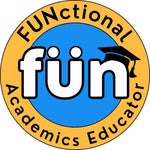For special education students in transition classrooms, ages 18-21, community outings provide valuable opportunities to practice real-world skills and foster independence. In this blog post, we'll explore five free community trip ideas, highlighting the skills and lessons these outings can offer to support the growth and development of these students.
1. Grocery Store:
- Finding Items on a Shopping List:
- Identify and locate the items listed on your shopping list.
- Practice efficient navigation through the store to locate products.
- Cost Comparison Practice:
- Develop skills in comparing prices of similar items to make informed purchasing decisions.
- Explore different brands and products to understand cost variations.
- Practicing Appropriate Social Interactions and Asking for Help:
- Enhance social interaction skills by engaging with others in a polite and friendly manner during shopping.
- Practice asking for assistance or guidance when needed, fostering effective communication in various situations.
- Creating Shopping Lists:
- Develop the skill of creating organized and effective shopping lists.
- Prioritize items based on needs and preferences.
- Enhance efficiency in navigating stores with well-planned lists.
2. Post Office:
-
- Instruct students on the essentials of addressing letters, covering recipient details, return address, and proper stamp placement.
- Guide them in mastering the skill of preparing mail with accurate addressing.
-
How to Mail Letters or Packages:
- Teach students when to use a mailbox versus the counter for mailing.
- Provide step-by-step instructions on the necessary procedures and effective communication when sending letters or packages.
-
Navigating the Postal System:
- Offer insights into the operational aspects of the postal system and guide students on where to go for different services.
- Instruct students on navigating the postal service efficiently, ensuring they have a clear understanding of its workings.
-
Communication with Postal Workers:
- Develop polite and effective communication skills with postal workers.
- Learn what to say and how to interact with postal staff for a smooth experience.
-
Time Management for Sending Mail:
- Understand the timeframes for sending letters versus packages.
- Explore different shipping options and manage time effectively when using postal services.
3. Library:
-
Learning and Using Library Resources Independently:
- Guide students in exploring the array of library services, including book searches, computer use, and accessing databases.
- Instruct on utilizing library resources independently, covering topics such as book lookup, computer usage, and understanding associated costs.
-
Conducting Research and Finding Information:
- Provide guidance on conducting research, teaching students effective methods for searching and retrieving information from various sources.
-
Checking Out and Returning Books:
- Instruct students on the step-by-step process of checking out and returning books, ensuring they are familiar with library borrowing procedures.
-
Interacting Respectfully in a Quiet Public Space:
- Teach students the importance of respectful behavior in a quiet library environment.
- Guide students in maintaining a focused and courteous atmosphere while using library facilities.
4. Local Park:
-
Engaging in Outdoor Activities:
- Instruct students on the various outdoor activities available at the local park.
- Guide them in safely participating in and enjoying these activities.
-
Cleaning Up and Maintaining a Public Space:
- Teach the importance of cleanliness and maintaining a public space like the park.
- Provide guidance on responsible practices for cleaning up after oneself and keeping the park environment tidy.
- Cultivating the Ability to Enjoy and Manage Free Time Effectively:
- Encourage students to explore and appreciate free time in the park.
- Provide strategies for managing leisure time effectively for a fulfilling experience.
- Practicing Appropriate Social Skills:
- Instruct students on appropriate social behavior in a public outdoor setting.
- Foster the development of social skills, including politeness and consideration for others.
- Planning and Organizing a Picnic:
- Guide students in the process of planning and organizing a picnic in the park.
- Cover aspects such as selecting a location, preparing food, and ensuring a successful and enjoyable picnic experience.
5. Community Garden:
- Engaging in Outdoor Activities:
- Instruct students on the various outdoor activities available at the local park.
- Guide them in safely participating in and enjoying these activities.
-
Cleaning Up and Maintaining a Public Space:
- Teach the importance of cleanliness and maintaining a public space like the park.
- Provide guidance on responsible practices for cleaning up after oneself and keeping the park environment tidy.
-
Cultivating the Ability to Enjoy and Manage Free Time Effectively:
- Encourage students to explore and appreciate free time in the park.
- Provide strategies for managing leisure time effectively for a fulfilling experience.
-
Practicing Appropriate Social Skills:
- Instruct students on appropriate social behavior in a public outdoor setting.
- Foster the development of social skills, including politeness and consideration for others.
-
Planning and Organizing a Picnic:
- Guide students in the process of planning and organizing a picnic in the park.
- Cover aspects such as selecting a location, preparing food, and ensuring a successful and enjoyable picnic experience.
These community trip ideas offer a range of experiences for special education students in high school or transition classrooms, promoting independence, social skills, and practical life knowledge. By incorporating these outings into the curriculum, educators can create meaningful learning opportunities that prepare students for greater autonomy in their daily lives.

